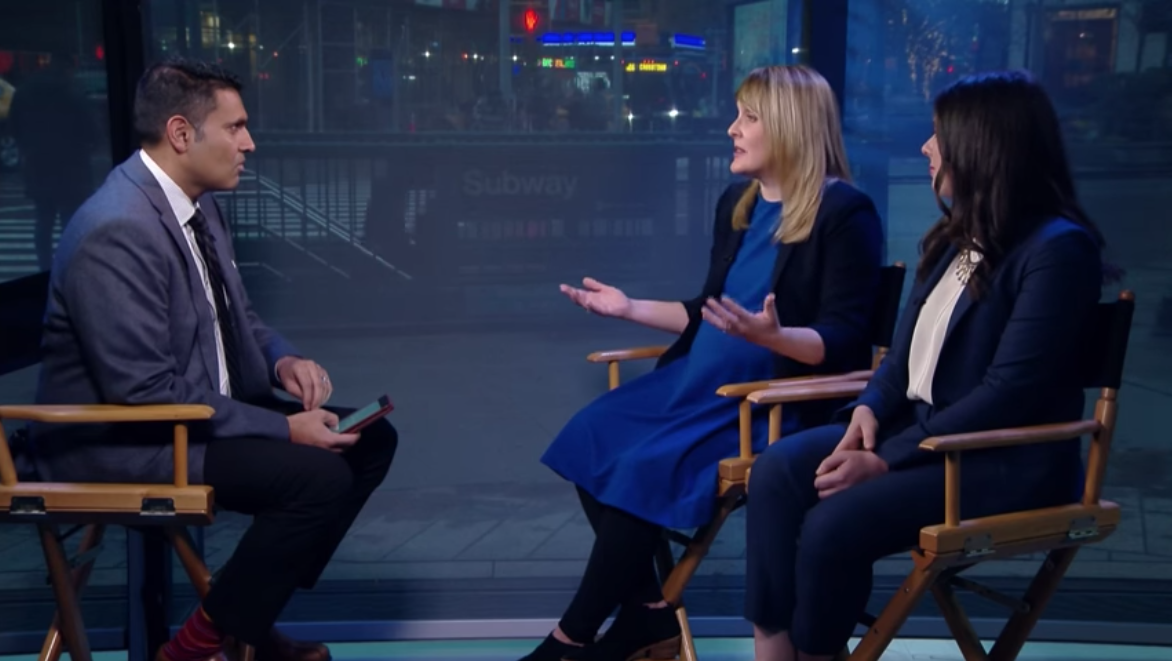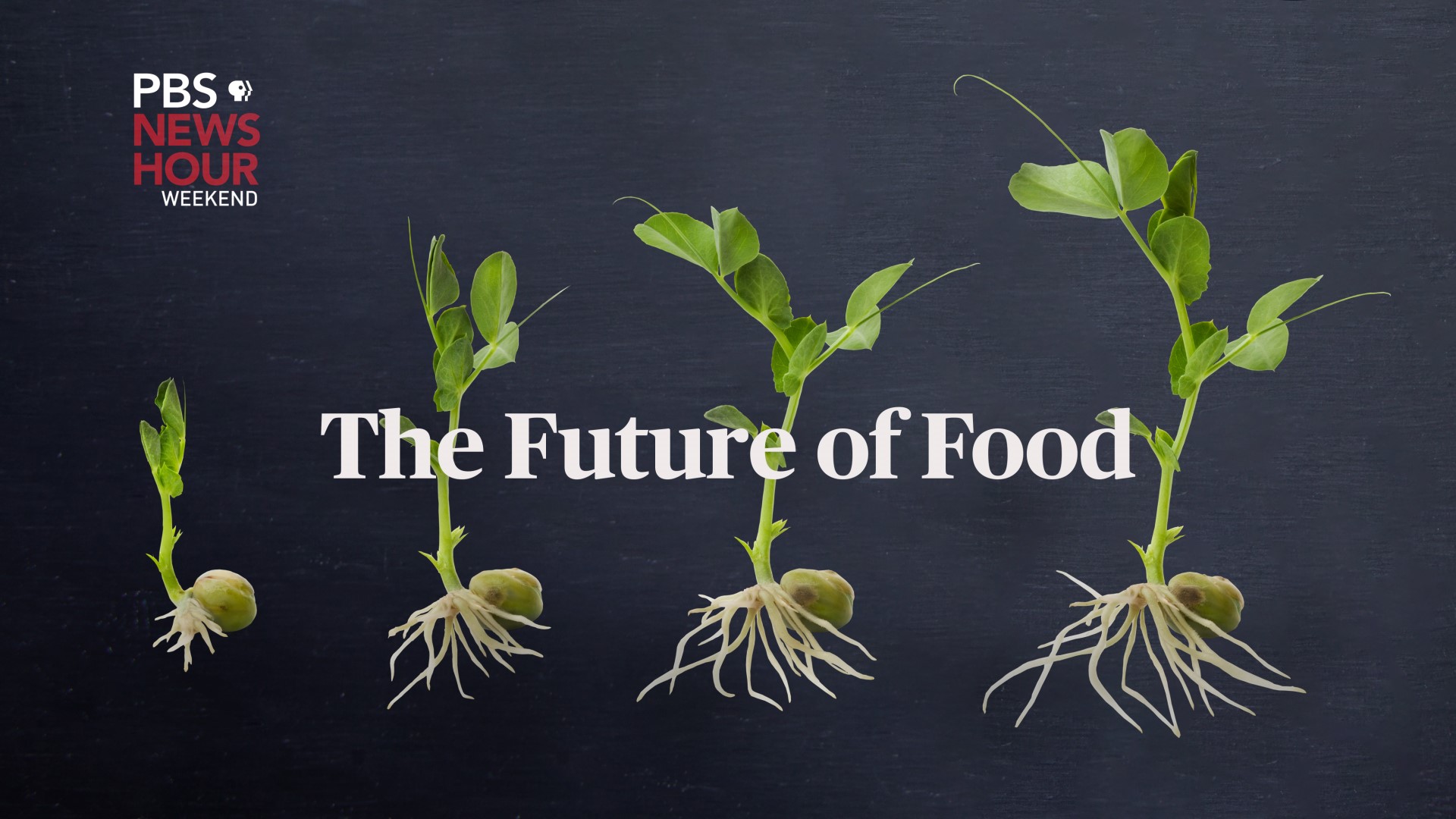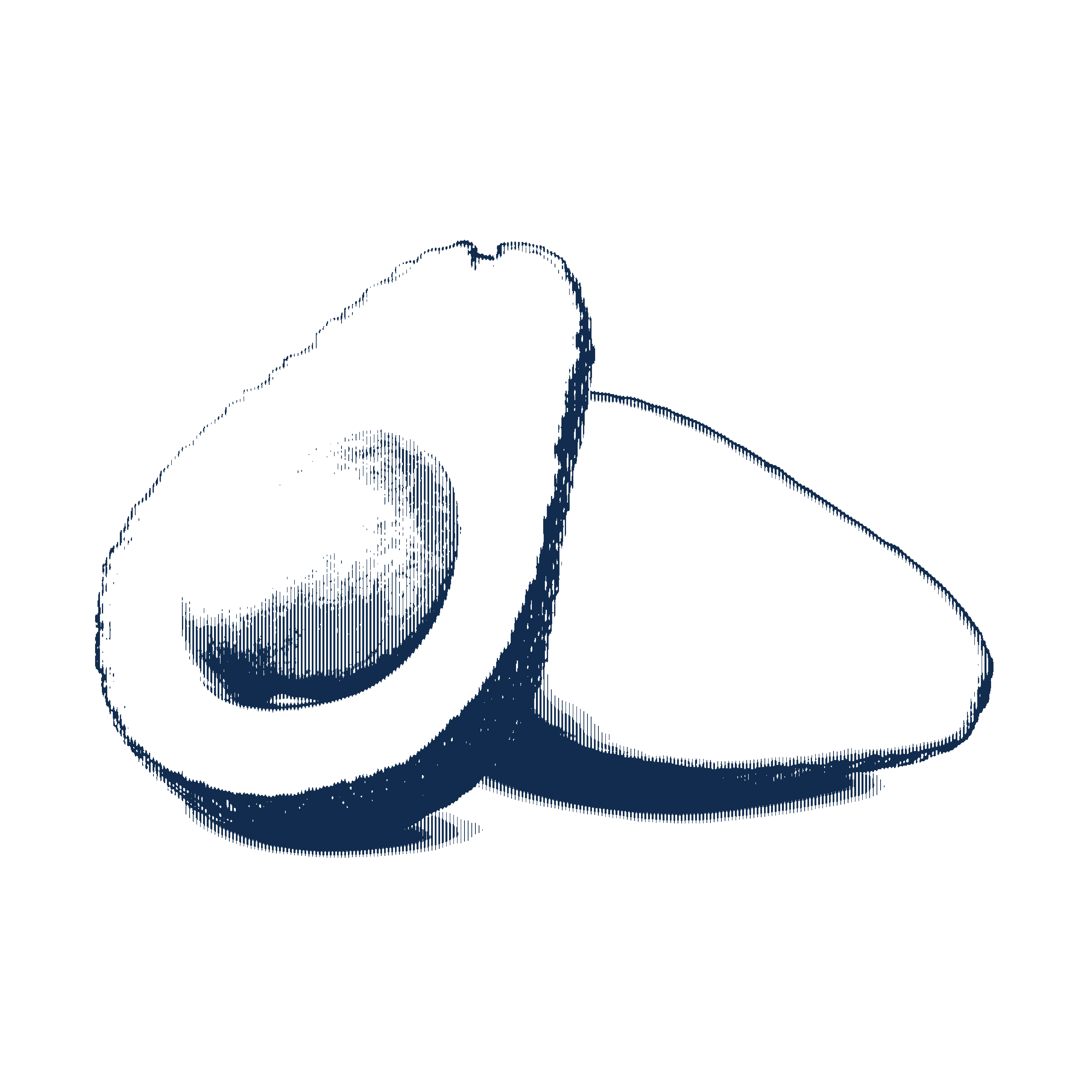
Karina Mitchell:
NewsHour Weekend introduced a new series this year called "The Future of Food." It explores what is being done globally to increase food sustainability and combat food insecurity.
For more, here's Hari Sreenivasan again with the series co-producers Megan Thompson and Melanie Saltzman.
Hari Sreenivasan:
Our resident foodies are in the house. Melanie, Megan. How did the series about food come in the first place?
Melanie Saltzman:
We all eat food, and it's the intersection of so many things politics, the environment, climate change, technology, so many things we've learned kind of revolve around it and are affected by it. And then, we also reached out to Mark Bittman, who's a very well-known food author, and he kind of came on board as both one of our reporters and as our host.
Megan Thompson:
So we ended up coming up with three different sort of topic themes. We did a few stories about technology and food. We tell you stories about farming, and we did a couple of stories about what we're calling food waste and food security.
Hari Sreenivasan:
Let's start with the tech angle. You had a couple of pieces around that. What do you find fascinating about it?
Melanie Saltzman:
Genetically modified salmon is the first animal approved for human consumption. Millions of dollars went into research. The FDA took decades to approve it. And now it's actually happening. So we thought that it was a really worthwhile story to kind of look at genetic modification and see how the salmon could be on your plate in the very, very near future.
Megan Thompson:
A genetically engineered salmon that grows twice as fast as regular salmon while actually consuming less feed. The difference is significant.
Megan Thompson:
It's really hard to believe that the salmon are the same age. And there's such a huge size difference between the two of them.
AquaBounty worker:
This fish is five kilos, ready for market. That fish is a long ways from market.
Megan Thompson:
In the United States, the majority of the salmon consumed is Atlantic salmon. But almost all of it is imported from ocean farms in Norway, Chile and Canada. That's because in the U.S., wild Atlantic salmon is endangered. So catching it is illegal. Ocean farming is only permitted in a few places. And until recently, there wasn't much interest in expensive land-based production like AquaBounty's.
AquaBounty worker:
If you have a fish that grows a little faster, such as an AquaAdvantage that reaches marker weight in half the time, you can produce those fish almost anywhere because you can grow them in a land-based aquaculture facility closer to consumers. So you can reduce the transportation costs, you can reduce the carbon footprint associated with transportation. So this opens up a whole new opportunity for global salmon production.
Megan Thompson:
This is a pretty big deal. I mean, this company, AquaBounty, is doing something that's never been done before. What I think we both kind of found fascinating was that when we actually went to visit the company, it's actually sort of a really modest and sort of isolated operation.
Hari Sreenivasan:
Where isolated?
Megan Thompson:
So their main operations where they're producing the fish, or where they have been at least they had been, is in Prince Edward Island, Canada, which is off the coast, east coast of Canada. It's a small island.
Hari Sreenivasan:
There are no nonstops from New York.
Megan Thompson:
There are no nonstops from New York.
Melanie Saltzman:
The plane was tiny, tiny. And there was one guy that did everything. He was the stewardess. He was the pilot. He was the luggage guy. It was great.
Megan Thompson:
There was literally no door on the cockpit. It was, you know. And then once you get to the island, you have to drive another hour, out to the edge. And, you know, it's a small building behind a chain link fence. You'd have no idea what was happening in there. There's only really a handful of people even in this building. But they're doing something that's really huge and sort of groundbreaking. That was really interesting to see.
Hari Sreenivasan:
OK. Then you also had a piece also tech-related, but meat grown in a lab. I think anybody hears that sentence, there's a…mm.. Moment about it. But when do you what did you guys find?
Melanie Saltzman:
People think of meat in a lab and they think of plant-based. But this was fascinating to us because it's actual animal cells being taken into the lab and producing meat from the animal cells. And it's fascinating. You know, with all of our stories, we wanted to kind of take a solutions-based approach and say, there are all these problems with our food system, how can we tell reports that are both really digging into those problems but are possible solutions as well? But we're finding that they're really controversial. There are people who, for ethical reasons, really oppose cell-based meat. And in the same vein, for ethical reasons, really, really support it. So it's been interesting kind of diving into the controversy.
Megan Thompson:
Valeti started researching the idea of creating meat in a lab. He'd always been bothered by the environmental impacts of meat production and also the fact that billions of animals are slaughtered for meat each year.
Megan Thompson:
Valeti walked away from his promising cardiology career and moved his family to the San Francisco Bay area to pursue the idea of creating what's known as cell-based meat. In 2015, Valeti launched Memphis Meats, one of the first private companies in the world focused on the technology. The next year, Memphis Meats debuted its first product.
Person:
It tastes like a meatball.
Hari Sreenivasan:
Okay. You did both taste it. And?
Megan Thompson:
It was pretty good.
Megan Thompson:
You know, we tasted two different chicken products. One of the companies was making a chicken nugget. These ground-meat products are a little bit easier to make because it's basically a combination of animal cells they've grown in a lab, and other ingredients, right? You know, these other ingredients help with the texture and the taste. So the chicken nugget was pretty tasty. It was fried. It was, you know, dipped in a sauce. And it sort of brings up another, you know, kind of, maybe awkward point about these stories, which was before we did this series about food, I don't think I have ever had to eat on camera before! I had to eat for like, three different of these stories.
Melanie Saltzman:
I've been getting so much joy. It's so weird. I feel like I'm putting her through her paces. But, I'm like, just take one more bite. Just take one more bite. And yeah, we've done a bunch of shooting, a bunch of scenes of getting her to eat everything from the chicken, to the chicken nuggets to the salmon, to hamburgers.
Megan Thompson:
OK. Here I go.
Valeti:
Go for it.
Megan Thompson:
It's very tender. Do you think that they'll ever be able to grow a hamburger like this in a lab?
Valeti:
I think given enough time and research and development, yes.
Megan Thompson:
He gave me a taste of the product.
Melanie Saltzman:
It's delicious.The grain is nice and crunchy. It's got a nice chew to it.
Hari Sreenivasan:
Let's talk a little bit about the farming pieces you guys also did, and how not just technology, but how we need to be thinking about how our food is grown.
Melanie Saltzman:
I mean, a lot of the stories we did do have these international components. But we really wanted to do farming in the United States. And we started looking into Iowa. They're a powerhouse producer of corn, of soy. You know, 23 million acres of farmland produces those two crops. And it hasn't always been like that. But as a result, we learned that there is soil erosion, there's issues with flooding because the water doesn't get held onto the land like it used to. And there's nitrates going into the water. So there's water pollution. We kind of just realized because of this agricultural system, all of these issues have come to light. And we met with a small group of farmers that are trying to both continue their businesses, their livelihoods, but implement much more sustainable solutions as they move forward.
Narrator:
Sam Bennett is a sixth-generation farmer. Not like this. His family's been on this land in northwest Iowa since 1883. Like most farmers here, he grows mainly corn and soybeans. But today, Bennett is showing close to 100 fellow farmers some big changes he's making on his land.
Sam Bennett:
We're going to harvest probably middle of July. It looks like the rye will be ready before the oats.
Sam Bennett:
We have about 2,000 acres altogether on our farm. We've started integrating small grains like oats and rye into our rotation, too. And those really aren't crops that are found really anywhere in Iowa. There's not a lot of acres of those.
Narrator:
This practice of growing a variety of crops, taking a break from the corn and soybeans, is called diversified crop rotations. Bennett says he plants these crops closer together, so there are more of them. That means more roots in the soil, which improves soil and water quality.
Sam Bennett:
I think my dad comes from a generation that, if you work harder, you'll be more successful. And I think what I'd like to say in my generation is that if you work smarter, you'll be more successful. And taking on some of these newer practices, some of these sustainable practices, is working smarter.
Melanie Saltzman:
It's interesting because I had never been to Iowa. I don't know many farmers. And making those calls and trying to get people to open up to us, it was more challenging than I initially thought. It was a lot of just making phone calls and explaining our intentions and saying, look, we want to see what it's like being a farmer out here and some of the challenges you're dealing with. Please be open to talk to us. And in the end, they were great. Actually, one of the people who were hesitant to speak with me at first. At the end of a really long shoot day, he had a newborn baby at home, his wife, he said, you know, if we're done by six, I might be getting divorced, like, we gotta hurry up. So we're leaving. And my shooter, he was driving and got stuck in the ditch.
Camera person:
Currently, we're stuck in a ditch on the side of the road. I don't even know if this is actually a road.
Melanie Saltzman:
And I had to call farmer Sam and say, I'm really sorry, but we really need you to get us out of this ditch. And he had to come and leave the baby and leave the wife and he was great.
Melanie Saltzman:
Sam, you've come to save us?
Sam Bennett:
Working on it. Does this baby have four wheel drive? Maybe, probably not.
Melanie Saltzman:
He came out, got us, gave us a big hug and we were on our way. It was nice that he was willing to do that and he didn't leave us in the ditch. I felt good about it.
Hari Sreenivasan:
Yeah. So that was Iowa. Where else did you go?
Megan Thompson:
In doing some of the reporting for this story, we were both working on it, and somebody mentioned something called Kernza. And we were both like, what is Kernza? It turns out it's actually a very fascinating story. I mean, a lot of the environmental problems that Melanie was just talking about exist in farming because pretty much all the crops that we plant or the vast majority are annual plants. Something you don't really think about. But what that means is after one season, the plant dies. They had, you know, the roots have to be pulled out of the ground, and the soil to be turned over and replanted. And that actually is very damaging to the soil. And it's also a contributor to climate change. I mean, carbon dioxide is released out of the soil. So there are some scientists back in the seventies and eighties that said we should be looking into figuring out how to create crops that are perennials, crops that stand the ground for many years and can actually repair the soil and trap carbon. And the most successful thing they've come up with so far is something called Kernza. So it was a really fascinating story about something that not many of us, I mean, I did not realize that most of our food that we eat are these annual plants.
Hari Sreenivasan:
So after having done all of this, how has it impacted the way that you sit down at the table, whether it's your own or at a restaurant? Does it cross your mind, considering that you now have all this new information?
Melanie Saltzman:
It's funny. I come into the office every day. I go to the coffee shop downstairs. You guys know this about me. And I see them throwing away food every morning. And it got to a point where I went to the manager and I said, I'm doing this series, you know, I'm really passionate about it. And a few times I've convinced them I've gotten a big garbage bag and put all the food in to it and then gave it out to everyone in the office. It's small things.
Hari Sreenivasan:
Hmm. Hold on. I think I've had one of those snacks.
Melanie Saltzman:
But like I think doing this reporting for both of us, it makes me much more conscious about the things that we can be doing as consumers because it can be really depressing if you look at the system as a whole. But I think there really are tangible things that at least I've been trying to, kind of, implement into my life is as we've been doing these stories.
Megan Thompson:
I would say the same thing. There are a lot of these issues that I did think about before, but to your point, once you actually start digging in and learning more about them — I mean, it's almost like it makes grocery shopping and eating a little bit more stressful because you're sort of burdened with this knowledge now. Am I doing the right thing? Am I eating the right foods? Am I feeding my family the right foods? But I mean, ultimately, I think we both really enjoyed working on this series because, you know, we're sort of helping educate ourselves and our audience about all these different issues. And we've really just barely scratched the surface.
Melanie Saltzman:
I think a lot of the reporting we saw before this was very negative. It's not that this reporting hasn't been done before, but it was all about the problems with our food system. As we've been trying to explore it, it's not only about the problems, but it's about what on small levels can be done but what on larger levels is also being done so it's not so doom and gloom.
Hari Sreenivasan:
Melanie Saltzman, Megan Thompson, thanks to you both.
Megan Thompson and Melanie Saltzman: Thanks, Hari.








